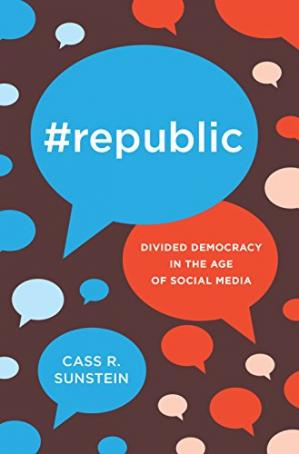 Zusammenfassungen
Zusammenfassungen
 As the Internet grows more sophisticated, it is creating new threats to democracy. Social media companies such as Facebook can sort us ever more efficiently into groups of the like-minded, creating echo chambers that amplify our views. It's no accident that on some occasions, people of different political views cannot even understand each other. It's also no surprise that terrorist groups have been able to exploit social media to deadly effect.
As the Internet grows more sophisticated, it is creating new threats to democracy. Social media companies such as Facebook can sort us ever more efficiently into groups of the like-minded, creating echo chambers that amplify our views. It's no accident that on some occasions, people of different political views cannot even understand each other. It's also no surprise that terrorist groups have been able to exploit social media to deadly effect.
Welcome to the age of #Republic.
In this revealing book, Cass Sunstein, the New York Times bestselling author of Nudge and The World According to Star Wars, shows how today's Internet is driving political fragmentation, polarization, and even extremism—and what can be done about it.
Thoroughly rethinking the critical relationship between democracy and the Internet, Sunstein describes how the online world creates "cybercascades," exploits "confirmation bias," and assists "polarization entrepreneurs." And he explains why online fragmentation endangers the shared conversations, experiences, and understandings that are the lifeblood of democracy.
In response, Sunstein proposes practical and legal changes to make the Internet friendlier to democratic deliberation. These changes would get us out of our information cocoons by increasing the frequency of unchosen, unplanned encounters and exposing us to people, places, things, and ideas that we would never have picked for our Twitter feed.
#Republic need not be an ironic term. As Sunstein shows, it can be a rallying cry for the kind of democracy that citizens of diverse societies most need.
 Dieses Buch erwähnt ...
Dieses Buch erwähnt ...
 Dieses Buch erwähnt vermutlich nicht ...
Dieses Buch erwähnt vermutlich nicht ... 
 Nicht erwähnte Begriffe | Daten, Google, Tiktok, Virtualität, Weblogs in education |
 Tagcloud
Tagcloud
 Zitationsgraph
Zitationsgraph
 Zitationsgraph (Beta-Test mit vis.js)
Zitationsgraph (Beta-Test mit vis.js)
 Zeitleiste
Zeitleiste
 4 Erwähnungen
4 Erwähnungen 
- Conformity - The Power of Social Influences (Cass R. Sunstein) (2019)

- Should you believe Wikipedia? - Online Communities and the Construction of Knowledge (Amy Bruckman) (2022)

- Momente der Datafizierung (Markus Unternährer) (2024)



- Alles überall auf einmal - Wie Künstliche Intelligenz unsere Welt verändert und was wir dabei gewinnen können (Miriam Meckel, Léa Steinacker) (2024)

 Volltext dieses Dokuments
Volltext dieses Dokuments
 Anderswo suchen
Anderswo suchen 
 Beat und dieses Buch
Beat und dieses Buch
Beat hat dieses Buch während seiner Zeit am Institut für Medien und Schule (IMS) ins Biblionetz aufgenommen. Beat besitzt kein physisches, aber ein digitales Exemplar. (das er aber aus Urheberrechtsgründen nicht einfach weitergeben darf). Es gibt bisher nur wenige Objekte im Biblionetz, die dieses Werk zitieren.











 Algorithmus
Algorithmus bias
bias Choice Architecture
Choice Architecture Demokratie
Demokratie Denken
Denken facebook
facebook Gesellschaft
Gesellschaft Instagram
Instagram Internet
Internet Long Tail
Long Tail machine learning
machine learning Microsoft
Microsoft Migration
Migration Politik
Politik Privatsphäre
Privatsphäre Religion
Religion Reputation
Reputation Sicherheit
Sicherheit snapchat
snapchat social media / Soziale Medien
social media / Soziale Medien Software
Software Terrorismus
Terrorismus Twitter
Twitter Virtual Reality
Virtual Reality Waffe
Waffe Weblogs
Weblogs





 Biblionetz-History
Biblionetz-History